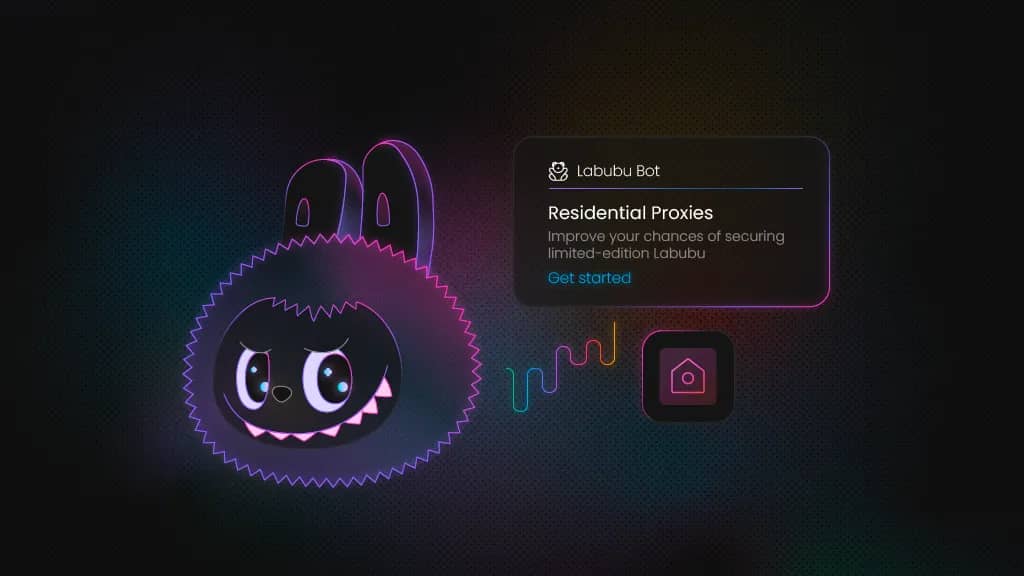How to Build a Labubu Bot with Residential Proxies: Step-by-Step Guide
Getting your hands on limited-edition Labubu figures like The Monsters, Big Into Energy, or Labubu Exciting Macaron has gotten absolutely wild lately. Once Pop Mart announced that they would no longer sell these figures in physical stores, the online shop got some serious traffic. But we're also talking about these Pop Mart drops selling out in literal seconds – forget about trying to cop manually, you'll never make it past the cart page. And thousands of users complain that they can’t cop a mystery box for themselves. Luckily, there’s an automated solution that’ll help you to get at least a couple of Labubus. The trusty bot, tuned with residential proxies, will handle CAPTCHAs, geo-blocks, and IP bans, helping you reach the checkout page as quickly as possible. This guide breaks down all the tactics that actually work, straight from people who've been crushing these drops consistently.
Zilvinas Tamulis
Last updated: Jan 09, 2026
9 min read

What is Labubu?
Labubu is this mischievous little character created by artist Kasing Lung. Picture sharp little teeth, big expressive eyes, and this quirky personality that's somehow both adorable and slightly unsettling, that's Labubu in a nutshell. Many collectors believe Labubu has an edge that sets it apart from everything else in Kasing Lung's collection.
The whole thing started with The Monsters series back in 2015. However, it gained viral popularity only in 2019 when toy company Pop Mart introduced it as collectible blind-box toys. And in 2026, collectors can even customize their Labubu figures with custom outfits and accessories from the world’s biggest brands.
But here's the thing – Labubu isn't just another toy. It has become a whole cultural phenomenon that combines art and collecting in one. The hype around new drops is real, and it's basically become the poster child for the entire designer toy scene.
When will Labubu restock?
Labubu restocks on Pop Mart are highly anticipated and often sell out within minutes. While Pop Mart doesn’t publish an official restock schedule, the collector communities on Reddit have identified consistent patterns based on repeated drops and shared experiences.
Restocks typically happen several times a week, especially between Tuesday and Thursday, with occasional drops on Sundays. Pop Mart restocks are most common in the evening for U.S. users, which translates to early morning or late-night restocks for international fans.
Here’s a table of the most common restock times by region:
Region
Approx. restock time
Notes
USA (Pacific)
7:00PM – 10:00PM PT
Most common window (Monday to Saturday)
USA (Eastern)
10:00PM – 1:00AM ET
Matches West Coast drop times
Europe (CET)
4:00AM – 7:00AM CET
Early morning drops
Asia (HKT/SGT)
10:00AM – 1:00PM HKT/SGT
Mid-morning drops, often the next day after the U.S. drop
Pop Mart releases can vary slightly from day to day, sometimes happening 10 to 15 minutes before or after the expected time. Because of this, collectors recommend refreshing the site or app early and frequently around the restock window.
To increase your chances, use the Notify Me option on Pop Mart’s product pages, which alerts you as soon as an item becomes available. Additionally, joining online communities like Reddit’s r/labubu, TikTok collector pages, or Discord groups can give you real-time alerts when drops go live.
While there's no guaranteed way to predict a specific restock, tracking patterns and being prepared during the hours above will maximize your chances of grabbing the Labubu figure you’re hunting for.
Why use a bot and proxies for Labubu?
Using a bot and residential proxies can improve your chances of securing limited-edition Labubu figures from Pop Mart, especially during high-demand drops that sell out in seconds. A bot automates the buying process, refreshing pages, adding items to the cart, and pushing you straight to the checkout page.
Basically, residential proxies make it look like you're just a regular person shopping from different spots around the world. This keeps you from getting IP banned, dodges CAPTCHAs, gets around location blocks, and stops you from getting shut down right when you're about to check out.
Together, bots and proxies give collectors a competitive edge in beating the rush and resellers, especially for rare releases that often disappear within moments.
What you’ll need to get a Labubu
To get your hands on a Labubu figure, especially during limited Pop Mart drops, you'll need to set up a few key things:
- Python (latest version) – you’ll use this to run the automation script.
- Playwright – a browser automation tool that helps your script interact with the Pop Mart website, just like a real user.
- Chrome or Firefox browser + driver – needed for Playwright to control the browser. Ensure the driver is compatible with your browser version.
- Residential proxies – help you avoid IP bans by rotating your IP and mimicking a real user's behavior.
- Pop Mart account(s) – you’ll need at least one active account to log in and complete the purchase; having more accounts increases your chances.
How to build a Labubu bot
To set yourself up for success, you’ll need a foolproof bot that automates the Labubu purchasing process.
Step #1 – set up your environment
To get started, install the Python programming language with the required libraries:
- Install Python. Get the latest version of Python from the downloads page. During installation, ensure that you add it to your system's PATH for easy script execution.
- Get Playwright. To install Playwright, you'll need to run a pip command in your terminal, followed by another command that installs the required browser binaries:
- Grab a scheduler. You'll want to write a script that performs specific actions at a defined time, so you'll need a way to schedule your jobs. APScheduler is a great option here:
Step #2 – create a project directory
You'll need to create a new folder for your project to store the script and result files. It's also a great idea to keep your project isolated with a virtual environment. Navigate to the folder inside your terminal:
The bot will consist of several files. You can create them all now, or do it as you follow along. For visual clarity, here's the project structure:
Step #3 – write the main script
To begin, you'll need to create an entry point for your bot. Create a main.py file and write the following code:
What this does:
- Runs the web scraper. The script executes popmart-scraper.py as soon as main.py is launched.
- Schedules automatic job processing. After the scraper runs successfully, it automatically schedules job-scheduler.py to process the scraped data.
- Implements retry logic. If the popmart-scraper.py script fails, it waits 10 seconds between each retry attempt, attempting up to 5 times before giving up.
- Sets up daily scraping. The script schedules popmart-scraper.py to run automatically every day at a set time using a cron-style scheduler.
Step #4 – scrape the New Arrivals page
Following the process of the main.py file, the first thing that will run is the popmart-scraper.py script. Here's what's inside it:
The code simply navigates to the New Arrivals page and retrieves information on when products are scheduled for release. It then saves the product names, release date, time, and URLs to the data/products.json file. In addition, it also:
- Handles website popups and navigation. The script automatically detects and closes location selection and policy acceptance pop-ups.
- Uses a proxy server for web requests. All browser traffic is routed through a specified proxy server with authentication credentials, allowing it to bypass restrictions or rate limiting. In this example, Decodo's residential proxies are utilized, which reliably evade detection and provide a secure method for scraping the website.
- Filters products by keywords. The script only collects data for products whose titles contain "THE MONSTERS" or "Labubu", ignoring all other items on the new arrivals page.
Step #5 – set up a job scheduler
The job-scheduler.py script is the key component in setting up automated jobs:
The script gets data from the products.json file, parses the data, and sets up a schedule to run a bot at the time of releases.
Step #6 – automate the purchase
The final piece of code is the script that does the most important thing – gets your Labubu in your shopping cart.
The script navigates to all of the product URLs at the time of release, clicks the ADD TO BAG button, then navigates to the shopping cart. The browser window remains open, allowing you to log in and complete the purchase!
Step #7 – launch the code
To launch the Pop Mart scraper bot, simply run the main.py file from your terminal:
That's all you need to do to get that limited edition Labubu! Here's a full breakdown of how it works:
- The script scrapes the New Arrivals page, retrieves the product names, links, release dates, and release times, and saves them to a JSON file. It will then repeat the process daily.
- A job scheduler runs immediately after, checking the JSON file and creating scheduled tasks to run at product release times.
- At release time, the bot will navigate to the specified URLs and automate the purchase process up to the checkout stage.
Best practices for botting Labubu drops
To increase your chances of getting that Labubu collectible, keep these tips on your side:
- Use a unique proxy per account – assign a different proxy to each browser profile or bot instance.
- Rotate proxies – for bulk operations, rotate your IP address after each checkout attempt.
- Randomize actions – add small delays and random mouse movements to mimic human behavior.
- Monitor for errors – if a checkout fails, switch proxies and attempt the checkout again.
- Test before drop – run your bot on non-peak products to ensure everything works smoothly.
Bottom line
Securing limited-edition Labubu figures has evolved from a casual hobby to a competitive digital sprint where milliseconds matter. While manual purchasing remains nearly impossible for high-demand drops, this automated approach levels the playing field for genuine collectors. The combination of Python automation, Playwright browser control, and residential proxies creates a robust system that handles the technical challenges, from bypassing geo-restrictions to managing CAPTCHAs.
Success ultimately depends on proper preparation – reliable residential proxies, thorough testing, and understanding that even the best-configured bot can't guarantee success in a market where demand consistently outstrips supply.
Now it's time to set up your Labubu bot and secure that blind box once again!
Test residential proxies for free
Activate your 3-day free trial with 100MB and access 125M+ IPs in 195+ locations.
About the author

Zilvinas Tamulis
Technical Copywriter
A technical writer with over 4 years of experience, Žilvinas blends his studies in Multimedia & Computer Design with practical expertise in creating user manuals, guides, and technical documentation. His work includes developing web projects used by hundreds daily, drawing from hands-on experience with JavaScript, PHP, and Python.
Connect with Žilvinas via LinkedIn
All information on Decodo Blog is provided on an as is basis and for informational purposes only. We make no representation and disclaim all liability with respect to your use of any information contained on Decodo Blog or any third-party websites that may belinked therein.

